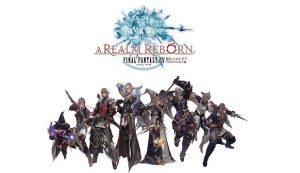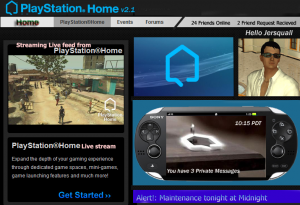Grinding Away Inside the Skinner Box
by NorseGamer, HSM Publisher
If there’s one thing I’ve grown exceedingly tired of in gaming, it’s grinding.
When I was a kid and I had all the time in the world, I thought nothing of spending months on Ultima V. And I firmly do believe that one of the major selling points for Final Fantasy VI as the pinnacle of the series is the sheer length of time it takes to truly explore it.
Today, though, I honestly don’t have the patience, let alone the time, for a 300-hour grind. I’ve just done it too many times.
This doesn’t mean I won’t invest that kind of time into a game; I just don’t want to feel like the play has been artificially lengthened by including a bunch of random encounters and pointless “go fetch” sidequests.
Case in point: Legend of Dragoon. Easily one of my favorite console RPG experiences. Downloaded it to my PS3. Decided to jump in–
–and quickly turned it off again.
Just too damn many random encounters. As innovative as the combat system is in that game, I don’t want to enter into combat every seven seconds. That’s just annoying.
Another example: Final Fantasy VIII. My personal favorite entry into the series. And you know how I had the most fun with it? When I used a GameShark to max out everything and turn off random encounters. All of a sudden, the game’s story made a lot more sense because I could actually follow the narrative thread.
Thing is, though, sometimes a grind is good.
 For instance: LKWD Life. Now that I’m on the development side of things for Home, I can’t really write about fellow Home studios any more (with a few exceptions), but this instance merits it. What a brilliant move by Lockwood to create a loyalty program! Home sorely lacked such a feature up until Sony’s Home Challenges were introduced, and Lockwood’s been very smart to keep users focused on Lockwood tasks and commodities with its own proprietary loyalty program.
For instance: LKWD Life. Now that I’m on the development side of things for Home, I can’t really write about fellow Home studios any more (with a few exceptions), but this instance merits it. What a brilliant move by Lockwood to create a loyalty program! Home sorely lacked such a feature up until Sony’s Home Challenges were introduced, and Lockwood’s been very smart to keep users focused on Lockwood tasks and commodities with its own proprietary loyalty program.
Of course, this requires grinding. But so what? No one’s forcing any user to take part in it. The classic complaint about Home is that there’s nothing to do — which is very neatly eliminated with a long grind towards a goal. The rewards themselves are secondary to the journey; it is the activity itself which is worth doing, more than simply earning a reward.
The same is true of VEEMEE’s Acorn Park. They’ve latched onto the grind concept, because it’s key to making a game work in Home. 2012 was the Year of the Game in Home, and the reason why we haven’t seen very many stand-alone games inside Home since then is because they’re bloody expensive to produce and they usually don’t sufficiently monetize to justify their existence. But by making Home itself a game via daily tasks, it gives Home a purpose.
 Grinding is nothing new in the MMO world. Final Fantasy XIV and Grand Theft Auto Online are simply the latest grindfests to hit the market (and, indeed, I doubt anything’s going to top EVE Online when it comes to grinding). At a recent production meeting, Burbie was telling us about how it took her and her friends five months of grinding to earn a clubhouse estate.
Grinding is nothing new in the MMO world. Final Fantasy XIV and Grand Theft Auto Online are simply the latest grindfests to hit the market (and, indeed, I doubt anything’s going to top EVE Online when it comes to grinding). At a recent production meeting, Burbie was telling us about how it took her and her friends five months of grinding to earn a clubhouse estate.
Jesus. These people pay a monthly subscription fee just to have the privilege of grinding that hard.
Here’s the thing, though: when you’re emotionally invested in something, it’s not objectionable at all. To the contrary, it’s welcomed. Even expected. Look at the recent outcry over World of Warcraft offering a means to legally and officially buy a leveled-up character; all of a sudden, the grind had a price tag, and that quantification somehow devalued the experience.
I sometimes wonder if the instant-gratification nature of Home is its weakness. Everything’s open to everyone, right off the bat. If you want something, you just buy it. So its power users have nothing to strive for, leaving them locked in a battle of buying stuff just to try to one-up fellow users they don’t like.
Ironic, isn’t it: Home was designed as a gamer’s utopia — being able to live inside a game world and chat with friends, go anywhere, enjoy all the different scenes, with no inherent skill as a gamer required. Nothing to achieve, everything to enjoy.
On paper, it should be perfect. Except it forgot human nature.
This is why, to me, Home is such a wonderful sociological case study: because as a social metaverse with no clearly defined purpose, it holds up a mirror to everyone who uses it. And the spectrum of behavior has been fascinating to watch throughout the years. In particular, users are creating their own grinds where none formally exist.
 I honestly believe that if Home had a clean-sheet redesign, grinding would need to be properly built into it. Complete a series of tasks before being able to leave your basic apartment. Complete a series of tasks before being able to leave your starting district’s public scene. Lock off nearly the entire world so that it is slowly revealed. Start users off in different districts, based on a pre-launch user questionnaire. Create an internal currency with jobs and tasks tied to a larger economy. Database-track all of the user’s activities and create achievements and unlockables based on them.
I honestly believe that if Home had a clean-sheet redesign, grinding would need to be properly built into it. Complete a series of tasks before being able to leave your basic apartment. Complete a series of tasks before being able to leave your starting district’s public scene. Lock off nearly the entire world so that it is slowly revealed. Start users off in different districts, based on a pre-launch user questionnaire. Create an internal currency with jobs and tasks tied to a larger economy. Database-track all of the user’s activities and create achievements and unlockables based on them.
And for God’s sake, charge a subscription fee.
It’s easy to say there’s nothing to do when everything is available right off the bat. Like it or not, we as species like our Skinner Boxes. Should a concept like Home ever be revisited, this design element should be built in from the beginning.
Share
| Tweet |



 LinkedIn
LinkedIn Twitter
Twitter
I agree with this assessment Norse. When you are given something to accomplish in the course of a game, a goal, it makes it much more interesting to come back each day to get a bit further into the game. The biggest problem I see in making a Home with this built in is that people come there for a different reason then to game. At least I do. I come for my friends and the fun times we have chatting and dancing the night away.
If there was a world built like you have suggested I could see a lot of people getting into it though, but then it would be a game, not the Home we have all grown to love and enjoy. It just wouldn’t be the same.
Too many grinds would make like a bunch of Facebook games. Come do you spy land, mafia town and farm business sim. Problem is these rely on advertising, small micro transactions and the ability for user to complete without paying nothing. Home grinds except aurora which incidentally has had the longest shelf. Rely on bigger transactions, the user put into a situation where they have to pay to play or the reliance on friends to play. Most users wont play Lockwood life beyond level 10. Most have forgot the grinding games that have been before like fubar. I agree with burbie. In other mmos that are supposed to be social there’s much more influences around music and dancing than grinding games. Subscription fees can only come if home drops outside developers, because the mess that some of them have left behind after going would mean that someone else would have to repair the mess or users won’t pay for a bunch of broken spaces. Subscription fees mean minimal issues or timely repairs none of which home does currently.